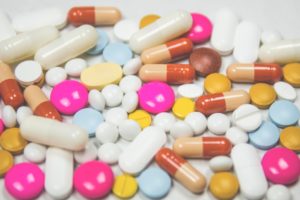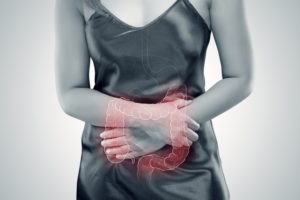In order to treat our bodies of bacterial infections, we take antibiotics. Many people are against the use of antibiotics and vaccines in hopes of leaving a natural, clean life. Antibiotics do far more good than they do harm in many cases, but antibiotics can leave lasting affects on the body’s digestive system.
Introduction:
Pseudomembranous colitis is often referred to as the antibiotic- associated colitis. It is also called C. difficile colitis. Pseudomembranous colitis is inflammation of the colon and is associated with an overgrowth of the bacterium Clostridium difficile, C diff for short. The overgrowth of Clostridium difficile is most often related to recent antibiotic use.
How antibiotics cause pseudomembranous colitis:
 Normally, the body will naturally keep the bacteria in the colon in a healthy balance. Antibiotics and other medications can upset and throw off the balance though. Pseudomembranous colitis takes place when the Clostridium difficile bacteria quickly outgrows other bacteria that would normally keep them in check and balanced. Specific toxins produced by Clostridium difficile are usually only seen in tiny amounts. But they can rise to dangerous levels high enough to damage the colon.
Normally, the body will naturally keep the bacteria in the colon in a healthy balance. Antibiotics and other medications can upset and throw off the balance though. Pseudomembranous colitis takes place when the Clostridium difficile bacteria quickly outgrows other bacteria that would normally keep them in check and balanced. Specific toxins produced by Clostridium difficile are usually only seen in tiny amounts. But they can rise to dangerous levels high enough to damage the colon.
Almost any antibiotic has the potential to cause pseudomembranous colitis, but some are more likely to cause pseudomembranous colitis than others. These include fluoroquinolones which you may know as their names ciprofloxacin (Cipro) and levofloxacin (Levaquin). It also included penicillins which you may know as amoxicillin and ampicillin.
Clindamycin (Cleocin) and cephalosporins such as cefixime (Suprax) are also more likely to cause pseudomembranous colitis. Doctors tend to veer away from the antibiotics mentioned above or may just prescribe lighter doses of such antibiotics. Many people have allergies to penicillins or clindamycin anyways, so be aware of the antibiotics that have caused reactions for you in the past.
Other drugs may cause pseudomembranous colitis:
There are other drugs that may cause pseudomembranous colitis, not just antibiotics. Drugs used during the treatment as cancer, such as chemotherapy drugs, may disrupt the normal balance of bacteria in the colon. People that have ulcerative colitis, Crohn’s disease, or other diseases that affect the colon are predisposed to pseudomembranous colitis.
Clostridium difficile spores are resistant to most common disinfectants which means they can be transmitted from the hands of health care professionals to patients. Doctors take this seriously. It is becoming far too common for people with no known risk factors. This includes people that have no had any recent health care contact or use of antibiotics. This is referred to as community-acquired C. difficile.
Risk Factors:
You are at risk for pseudomembranous colitis if you are taking antibiotics. If you are over 65 years old, staying in a hospital or nursing home, or have a weakened immune system, you are at risk. If you have a colon disease such as inflammatory bowel disease or colorectal cancer, you are more at risk. Lastly, if you are undergoing intestinal surgery or receiving chemotherapy treatments, you are also at risk for pseudomembranous colitis.
Symptoms:
 Similarly to other issues, it is best to be aware of the signs and symptoms in order to get immediate treatment. Symptoms include fever, diarrhea, abdominal cramps, pain or tenderness, pus or mucus in the stool, nausea, and dehydration. Symptoms may begin as early as two days after beginning the antibiotic and as late as two weeks after you finish taking the antibiotic.
Similarly to other issues, it is best to be aware of the signs and symptoms in order to get immediate treatment. Symptoms include fever, diarrhea, abdominal cramps, pain or tenderness, pus or mucus in the stool, nausea, and dehydration. Symptoms may begin as early as two days after beginning the antibiotic and as late as two weeks after you finish taking the antibiotic.
If you are left untreated, you are at risk for life-threatening complications. Possible complications include hypokalemia which is abnormally low levels of potassium in your blood. From having diarrhea, people may have significant loss of fluids and electrolytes causing severe dehydration and kidney failure. The dehydration may then cause abnormally low blood pressure.
Pseudomembranous colitis can even cause a hole in your bowel which can lead to a major infection of the abdominal cavity. Also, in very severe cases, toxic megacolon leaves people incapable of expelling gas or stool which causes the colon to rupture.
 It is very serious to seek treatment if you show any signs or symptoms. There are treatments which we will discuss next week. Make an appointment today with Gastroenterology Consultants of Central Florida to seek immediate treatment and leave pseudomembranous colitis in the past.
It is very serious to seek treatment if you show any signs or symptoms. There are treatments which we will discuss next week. Make an appointment today with Gastroenterology Consultants of Central Florida to seek immediate treatment and leave pseudomembranous colitis in the past.
Please drop off any new, unused, unwrapped toys for Toys for Tots to help children have a wonderful Christmas!
Staff Writer
